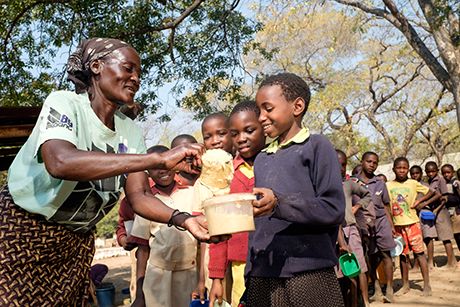Irish Aid marks 10 Years of the Emergency Response Fund Scheme
14/3/17
Irish Aid marks 10 Years of the Emergency Response Fund Scheme
During the Zimbabwe food crisis, a local volunteer cooks and hands out porridge to Surprise (age 10) at a village school where 150kg of healthy corn-soya blend is provided by NGO partners each day. 28/07/16 Photo Credit: Trócaire
Now in its 10th year, the Emergency Response Fund Scheme (ERFS) was established to promote early action and reduce loss of life in a sudden humanitarian crisis. Irish Aid has just allocated €2.7 million to six humanitarian partners under the Scheme for 2017: Concern Worldwide, Trócaire, Christian Aid Ireland, Plan International Ireland, World Vision Ireland and Oxfam Ireland.
How does the Fund work?
The scheme is particularly geared towards the initial weeks after the onset of an emergency and targets those in immediate need.
At the beginning of each year, Irish Aid pre-positions a defined amount of funding with long-standing partner NGOs. With approval from Irish Aid, NGOs can access these standby funds to respond quickly after an emergency occurs, or when a protracted humanitarian situation suddenly deteriorates. It allows time for a rapid assessment of need and speedy planning to ensure appropriate responses.
Over the last decade, Irish Aid’s partners have carried out more than 150 humanitarian responses to emergencies in over 40 countries, through ERFS support. Here we take a look back at how they responded to five of the most significant crises of the past decade.
2010 Haiti Earthquake
On January 12, a 7 Magnitude earthquake caused massive destruction and loss of life in Haiti, with death-toll estimates ranging from 100,000 to 160,000 people. ERFS partner Concern Worldwide immediately began rolling out safe drinking water and hygiene facilities to those whose homes had been destroyed, while GOAL carried out an emergency response to a cholera outbreak in Port-au-Prince and implemented a Cash for Work programme to support local livelihoods, recovery and reconstruction.
2012 Philippines Typhoon
The Category 5 Super Typhoon Bopha, known locally as Typhoon Pablo, cut across the Philippines in December and devastated many areas, causing destruction of property and affecting over 6 million people. Emergency responses followed from Christian Aid Ireland, who provided immediate food, shelter, non-food items and emergency cash assistance to poor and vulnerable families. Plan International Ireland was supported to distribute water and hygiene kits in a number of communities.
2014 Ebola Response
In 2014 alone, the Ebola virus epidemic affected over 20,000 people and left millions at risk in several West African countries. Concern Worldwide, GOAL, World Vision Ireland and Oxfam Ireland all implemented ERFS responses aimed at reducing and preventing the spread of the disease in Sierra Leone, supporting survivors and addressing the specific gender dynamics in the Ebola response. Concern also worked in Liberia, implementing prevention and awareness-raising strategies, while Plan International Ireland distributed hygiene kits in Guinea, reaching over 550,000 people.
2015 Nepal Earthquake
The catastrophic 7.8 Magnitude earthquake in Nepal on April 25 killed 8,000 people and affected 8 million more. This prompted humanitarian responses from all 6 current ERFS partners – Concern Worldwide, Trócaire, Plan International Ireland, World Vision Ireland, Christian Aid Ireland and Oxfam Ireland – who provided food, access to health services, water purification systems, temporary shelter and non-food items to those in need.
2016 El Niño
From 2015 to 2016, the El Niño phenomenon brought extreme weather conditions, mainly drought and flooding, to over thirty countries worldwide. Concern Worldwide responded to severe food insecurity and malnutrition in Ethiopia, Mozambique and Uganda by providing vulnerable communities with water, food, seed assistance and access to improved health services. Christian Aid Ireland supplied food to drought-affected households in Malawi, and to households experiencing food insecurity in South Sudan as a result of conflict and drought. In Zimbabwe, Oxfam Ireland, Plan International Ireland and Trócaire also responded to emergency food security needs. In Somalia, World Vision Ireland implemented child health and nutrition services for drought-affected communities, and Trócaire addressed a cholera outbreak resulting from a lack of clean water.
Reflecting on 10 years of the Emergency Response Fund Scheme, Joe McHugh T.D., Minister of State for the Diaspora and International Development, stated:
“The ERFS scheme is a critical component of Ireland’s global humanitarian assistance, allowing for rapid, life-saving and life-sustaining responses to situations of devastating crisis. Working with trusted partners, who are best-placed to respond, enables Ireland to meet critical humanitarian needs in countries where we may not ourselves have a presence on the ground. I applaud the continued essential work of our partners in humanitarian action and their role in delivering on Ireland’s values and objectives of a just and sustainable world”.
Related Information
Irish Aid also responded to these and other crises with complementary funding schemes, such as the Humanitarian Programme Plan (for situations of protracted crisis), the Rapid Response Initiative (by deploying emergency personnel and supplies), Calls for Proposals (for sudden onset emergencies), support to the Start Fund (for immediate response to smaller-scale, under-the-radar emergencies) and our programmes of bilateral assistance, such as in Sierra Leone during the Ebola crisis.
Find out more about ERFS.

